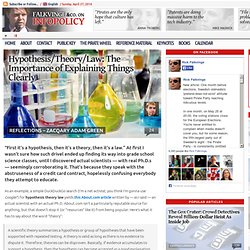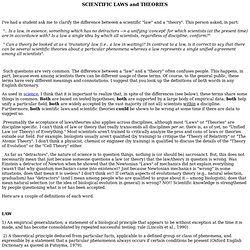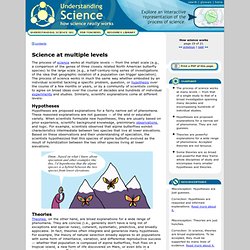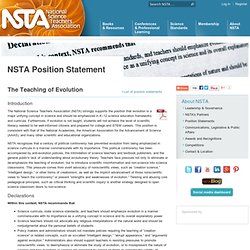

Scientific Theory v. Law. Theory. Hypothesis/Theory/Law: The Importance of Explaining Things Clearly. Reflections – Zacqary Adam Green “First it’s a hypothesis, then it’s a theory, then it’s a law.”

At first I wasn’t sure how such drivel ended up finding its way into grade school science classes, until I discovered actual scientists — with real Ph.D.s — seemingly corroborating it. That’s because they speak with the abstruseness of a credit card contract, hopelessly confusing everybody they attempt to educate. As an example, a simple DuckDuckGo search (I’m a net activist; you think I’m gonna use Google?) For hypothesis theory law yields this About.com article written by — as I said — an actual scientist with an actual Ph.D. A scientific theory summarizes a hypothesis or group of hypotheses that have been supported with repeated testing. Wow, my brain started to hurt halfway through that paragraph.
Let’s look at an example of allowing lesser-educated people to understand what the hell you’re talking about. A theory is a list of related laws*, which together explain a broader concept. Scientific Laws and Theories. SCIENTIFIC LAWS and THEORIES I've had a student ask me to clarify the difference between a scientific "law" and a "theory".

This person asked, in part: ".. Is a law, in essence, something which has no detractors --> a unifying 'concept' for which scientists (at the present time) are in accordance with? Is a law a single idea by which all scientists, regardless of discipline, conform? " " Can a theory be looked at as a 'transitory' law (i.e., a law in waiting)? Such questions are very common. As used in science, I think that it is important to realize that, in spite of the differences (see below), these terms share some things in common. Presumably the acceptance of laws/theories also applies across disciplines, although most "Laws" or "Theories" are discipline specific. As far as "detractors", the nature of science is to question things, nothing is (or should be) sacrosanct.
Here are a couple of definitions of each word. 4) 1. Literature Cited Futuyma, D. Krimsley, V. Science at multiple levels. The process of science works at multiple levels — from the small scale (e.g., a comparison of the genes of three closely related North American butterfly species) to the large scale (e.g., a half-century-long series of investigations of the idea that geographic isolation of a population can trigger speciation).

The process of science works in much the same way whether embodied by an individual scientist tackling a specific problem, question, or hypothesis over the course of a few months or years, or by a community of scientists coming to agree on broad ideas over the course of decades and hundreds of individual experiments and studies. Similarly, scientific explanations come at different levels: Hypotheses Hypotheses are proposed explanations for a fairly narrow set of phenomena. These reasoned explanations are not guesses — of the wild or educated variety. TheoriesTheories, on the other hand, are broad explanations for a wide range of phenomena. Position Statement: Evolution. Introduction The National Science Teachers Association (NSTA) strongly supports the position that evolution is a major unifying concept in science and should be emphasized in K–12 science education frameworks and curricula.

Furthermore, if evolution is not taught, students will not achieve the level of scientific literacy needed to be well-informed citizens and prepared for college and STEM careers. This position is consistent with that of the National Academies, the American Association for the Advancement of Science (AAAS), and many other scientific and educational organizations. NSTA recognizes that a century of political controversy has prevented evolution from being emphasized in science curricula in a manner commensurate with its importance.
This political controversy has been accompanied by anti-evolution policies, the intimidation of science teachers and textbook publishers, and the general public's lack of understanding about evolutionary theory. Evolution is Not Just a Theory: home.